Official Titles:
Genbukan World Ninpo Bugei Federation, President
Kokusai Jujutsu Renmei/Federation, Executive Director
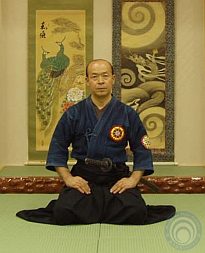
Basic Training
Grandmaster Tanemura was born with the name Tsunehisa Tanemura on the 28th of August 1947, in the town of Matsubushi, which is located in Saitama prefecture, Japan. Tsunehisa was his given name, but later he took the name "Shoto" meaning the "Law of the Sword".
His father, Sadatsune Tanemura, was the 17th family head of a Samurai line, whose roots extend to those of the Emperors Uda and Seiwa as well as having blood ties to the famous daimyo of the Sasaki and Takeda families. He was an expert in kenjutsu (the art of the sword) and jukenjutsu (the art of the bayonet), as well as various schools of jujutsu (Shizen Ryu system) and Ninjutsu (Takeda system). Being a very traditional father, Sadatsune introduced his son to the martial arts at a young age.
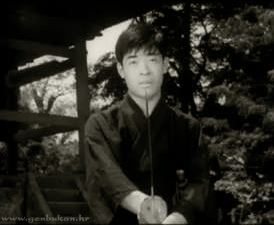 Early Development
Early Development
The young Tanemura was taught from the age of nine by his father and father's uncle, Kakunosuke Yamazaki, who was an 8th dan in the Onoha Itto ryu. He practiced unarmed techniques and sword almost everyday.
The training was always serious. It was conducted out-of-doors and the students went barefoot, regardless of the weather. He was regularly beaten up and knocked unconscious. When he was knocked out, a bucket of icy cold water would be used to revive him. Once awake, he was expected to continue his training immediately.
At the age of fifteen, he began to study Shindo Muso ryu Kenpo from the renowned Master Seishiro Saito. It was during these high school days that his quest for true martial arts was beginning take form and blossom. At the age of fifteen, Tanemura sensei also was fortunate enough to be initiated into the famous Asayama Ichiden ryu taijutsu along with Takagi Yoshin ryu jujutsu, Gikan ryu koppojutsu as well as other ancient schools of bujutsu (Japanese martial arts). His training was so concentrated, that he received his menkyo kaiden (full mastership) in Shinden Fudo ryu and Kukishin ryu at the age of twenty.
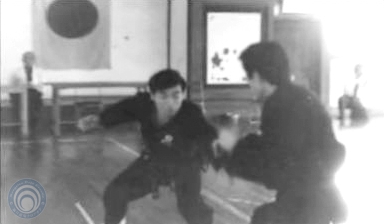
During his university days, Grand Master Tanemura was introduced to Dr. Kinbei Sato. Even though Sato sensei taught martial arts to many people, very few (including Tanemura sensei, at first) knew of Dr. Sato's training with Takamatsu sensei. It wasn't until more than a decade later, that Tanemura sensei (after ending his relationship with another teacher and starting the Genbukan) rediscovered Sato sensei. He was given special kuden (secret oral teachings) and by the winter of 1989, Dr. Kinbei Sato named him as the next Soke (Grandmaster) of Takagi Yoshin ryu, Bokuden ryu, Gikan ryu, and Kukishin ryu.
Hard Training
In addition to his classes at the dojo, the Grand Master trained anytime he was free to perfect his skill and techniques. His bujutsu masters were all very strict and closely guarded the secrets hidden within the kata (technique patterns). Each movement was shown only a few times. Then, the students were expected to discover from experience, the special body dynamics which allow the waza (technique) to work in a real situation.
To truly master these techniques, Grandmaster Tanemura drilled each technique several thousand times. Eventually, he discovered many kuden points, and made the technique a natural part of his movement. Living nearby woods, rice fields and riverbanks, he used everyplace as his dojo. Having natural objects such as trees, stones, animals always available, he used everything as his training partner.
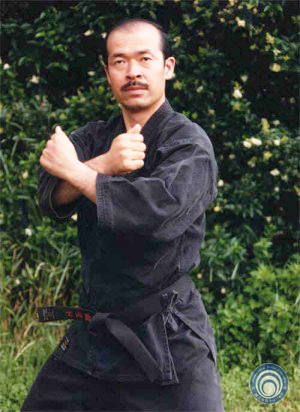
Trees and stones were used to develop punching and kicking power, and served to strengthen the hands and feet. He'd punch and strike a tree until his knuckles bleed and his toes were numb. But, Takamatsu Sensei taught him a much better way to develop an effective defense. Tanemura sensei was told that a true martial artist passes by a crowd unnoticed. If his hands are callused in a certain way, people can tell that he is some sort of martial artist. Even the way that different budoka (modern martial art practitioners) stand or walk, can reveal much about their training habits. In a fight, the less an opponent knows about your strengths and weaknesses, the better chance you have to survive.
On clear nights, the Grand Master would also practice with Yari (spear) and Rokushaku Bo (six-foot staff). In a rice field, with the crickets and the praying mantises, he'd thrust for the center of the moon to improve his accuracy, and pierce barely visible leaves, as they swayed in the wind. With animals (usually dogs), it was easy enough to get them to attack. As they'd leap to bite him, he used taisabaki (natural body movements, in this case, evasion) repeatedly, until the animal would simply give up.
Education and Mission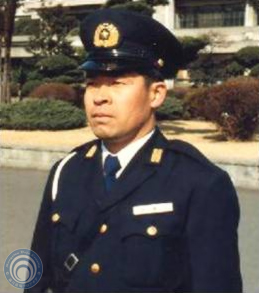
Grandmaster Tanemura majored in law and graduated from Hosei University. But instead of becoming a lawyer, he wanted a career that allowed him to be out on the streets using his Ninpo and Jujutsu knowledge to protect and help others. When the Grand Master was just deciding what to do with his life, he was involved in a terrible accident. A truck crushed his tiny car, and the injuries Tanemura sensei sustained (including large pieces of glass in his face) looked so bad, that someone mistakenly reported that he had died. In the hospital, forced to consider that his brief life might soon be over, Tanemura Sensei asked for Heaven's help. He promised to change several selfish things about himself, and dedicated the rest of his life to protecting others and teaching them to protect themselves.
At the age of twenty-two, he joined the Tokyo Metropolitan Police Department. From traffic cop to detective, his work as an officer enabled him to utilize and test all he had learned in the dojo. His skill was called upon on many occasions, and not once did it fail him. Observing his talent, his superiors allowed Tanemura Sensei to teach Ninpo and Jujutsu to policemen at a special martial arts club. Later, he officially became a professor at the police academy.
After fifteen years of service, he felt in his heart the need to preserve true martial arts in the whole world (not just Japan). So he resigned his job as a Lieutenant to carry out this mission. Soon after leaving the police department, he founded his Genbukan Ninpo Bugei Dojo and organized the Federation.
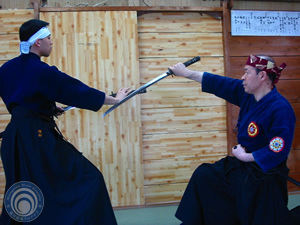
On November 28th, 1984, Grand Master Shoto Tanemura started with just a handful of students in his Matsubushi dojo. Now his, black belt instructors teach thousands of dedicated martial arts in over 15 countries as well as the Grand Master having personally taught seminars worldwide.




